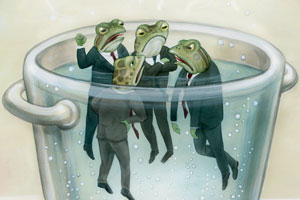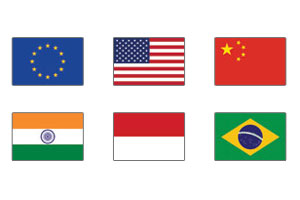
Photo: Wikimedia Commons
American Farm Bureau Federation
One of Capitol Hill’s most vocal lobby groups, it is also one of the nation’s largest crop and livestock insurance companies. Its county-level meetings have been a prime forum for airing fears about the climate bill.
Lobby spending: $2,634,661
Lobbyists: 37
Campaign contributions: $26,000
National Cattlemen’s Beef Association
The group that brought you “Beef: It’s What’s For Dinner” represents the likes of the American Hereford Association, Purina, Dow Chemical, McDonald’s, and Wal-Mart.
Lobby spending: $198,257
Lobbyists: 15
Campaign contributions: $225,047
National Pork Producers Council
Members include billion-dollar corporations like Cargill, Bayer, and Pfizer. Top priorities this year include a demand for a $250 million swine subsidy.
Lobby spending: $863,137
Lobbyists: 26
Campaign contributions: $202,134
National Milk Producers Federation
Has some 40,000 members, from local co-ops to titans like Kraft Foods; vows to “ensure that agricultural enterprises are shielded from any adverse impacts” of climate legislation.
Lobby spending: $460,000
Lobbyists: 17
Campaign contributions: $88,000
National Corn Growers Association
Works hard to defend high-fructose corn syrup and ethanol subsidies, often in concert with ag behemoths like Archer Daniels Midland and John Deere (which by itself spent more than $1 million on lobbying this year).
Lobby spending: $340,000
Lobbyists: 13
Campaign contributions: $71,500
National Farmers Union
Represents some 250,000 mostly small farmers and ranchers; the only major ag group supporting Waxman-Markey, it flew members to DC in September to lobby for it.
Lobby spending: $450,000
Lobbyists: 3
Campaign contributions: $57,500
Campaign contributions are for ’07/’08 cycle, House and Senate campaigns only. Lobby spending is for first half of 2009. All figures from the Center for Responsive Politics.














